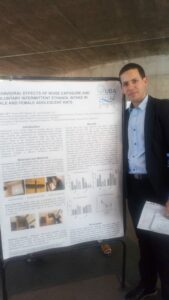Adolescence, a period in which complex behavioral skills develop, can be influenced by environmental agents such as ethanol (EtOH) and noise. Therefore, the aim of this work was to evaluate possible EtOH and noise-induced alterations, using different schemes.
Adolescent male Wistar rats were subjected to voluntary consumption of EtOH during intermittent 24-hour periods for one or two weeks, using the two-bottle choice paradigm (5% EtOH/1% sucrose). A subgroup was exposed to noise (2h, 95-97 dB) after the first week. All animals were evaluated on different behavioral tasks and ETOH intake was measured.
Results showed that noise exposure was able to impair performance in associative memory (AM) and to increase anxiety-like behaviors (Anx) when evaluated at short-term. On the other hand, animals subjected to EtOH intake showed an increase in risk assessment behaviors (RABs) and exploratory behavior (EB). When EtOH was ingested before noise exposure, Anx decreased and RABs increased. In contrast, at long-term, animals exposed to either noise or EtOH showed a decrease in AM and an increase in Anx. In noise-exposed animals, including those also subjected to EtOH intake, an increase in EB was additionally observed. In conclusion, these results suggest that exposure to EtOH or noise might induce differential behavioral changes and that co-exposure can generate more behavioral changes in long when compared with short-term schemes, probably due to the greater amount of EtOH consumed

Menu
E-poster
Session: 1
PS1-06 | EFFECT OF SHORT AND LONG-TERM ETHANOL INTAKE AND NOISE EXPOSURE IN ADOLESCENT MALE RATS: BEHAVIORAL DATA
Gustavo Ezequiel Buján
1ra cátedra de farmacología, Facultad de Medicina, Universidad de Buenos Aires.
- CABA,
- Argentina
- Gustavo Ezequiel Buján1
- , Héctor Alejandro Serra1
- , Sonia Jazmín Molina2
- , Laura Ruth Guelman1y2
- 1. Universidad de Buenos Aires. Facultad de Medicina. 1ª Cátedra de Farmacología. Buenos Aires, Argentina.
- 2. Universidad de Buenos Aires. Consejo Nacional de Investigaciones Científicas y Técnicas. Centro de Estudios Farmacológicos y Botánicos (CEFyBO, UBA-CONICET). Buenos Aires, Argentina.
